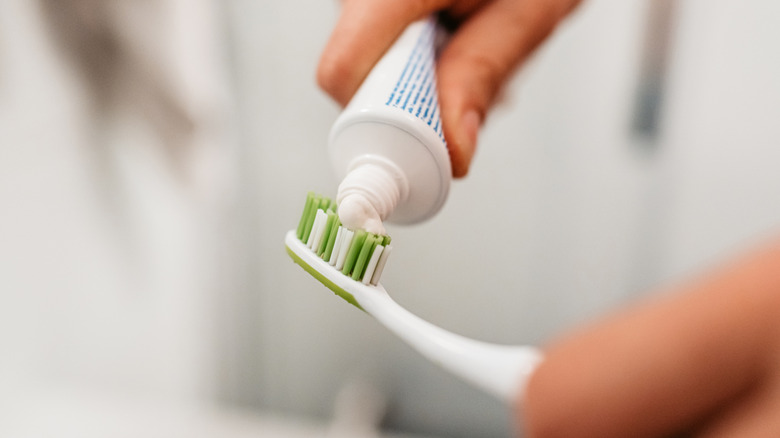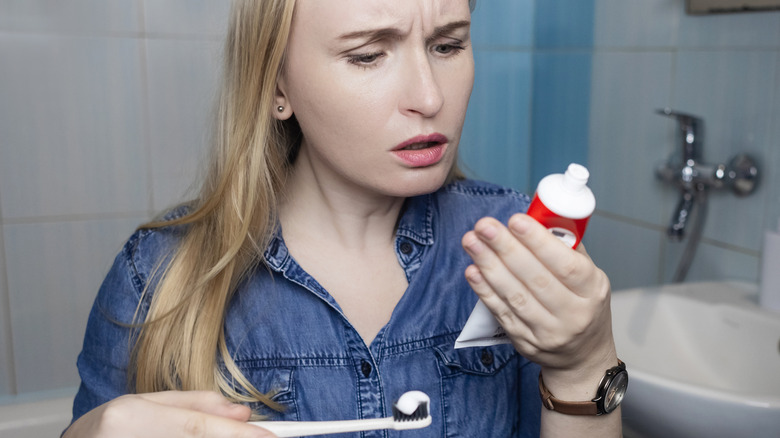The Largest Toothpaste Recalls Recorded In Recent US History
Your dentist will appreciate hearing that you're brushing twice daily with a fluoride toothpaste, in accordance with generally accepted tooth-cleaning recommendations. However, you might want to double-check that your toothpaste isn't part of a recall batch. Toothpaste, like any consumer product, can be flagged by the Food and Drug Administration (FDA) for problems. Plenty of hygienic goods have been pulled from distribution because the FDA deemed that they posed some type of risk.
The FDA doesn't always recall products, though. In 2024, an FDA warning to the parent company, Colgate-Palmolive, and Tom's of Maine, Inc., said that "significant violations" of Current Good Manufacturing Practice (CGMP) resulted in "microbial incidents in water and in OTC [over the counter] products." Colgate-Palmolive issued a statement that it was "working with the FDA" and that the company remains confident in the "safety and quality" of their toothpaste (via ABC News). None of the named products were removed from the market.
What can get a toothpaste brand into legitimate recall trouble, then? Many factors could be involved, as shown by some recent recalls. The 2025 FDA deodorant recall, for instance, was due to unspecified manufacturing procedures that did not comply with CGMP. Meanwhile, the 2023 recall of everyday foods was due to a possible listeria contamination. Below are other recent examples.
A voluntary recall by a retail chain 2022
A voluntary recall is a measure taken by a company to protect the public's safety by removing a product from circulation before the FDA has to take legal action. In 2022, the Family Dollar store chain voluntarily recalled some of the Colgate Optic White toothpaste sold throughout the country.
The voluntary FDA recall wasn't because of the quality of the toothpaste or a flaw in any batch. Instead, it was because of the way it had been stored. According to the recall notice, Family Dollar found that the toothpaste hadn't been kept under appropriate temperature conditions. However, the recall extended beyond toothpaste, and included an extensive, multi-page list of items such as mouthwash, antacids, and arthritis pain relief products. Family Dollar stores across the country were affected by the recall, including those in many western and southwestern states. The company clarified, though, that it hadn't received any complaints from consumers.
Although this recall was a few years ago, you still might want to check any toothpaste batches that might have been hanging around your house for a while. Toothpaste has a shelf life of around two years, which means a tube you bought a while ago might not be technically expired but deserves to be tossed rather than squeezed.
A 2025 Class II recall of over 4.5 million boxes of toothpaste
In terms of sheer volume, a recall in 2025 took more than 4.5 million individual containers of toothpaste out of circulation. The massive recall affected multiple toothpaste formulas that were distributed in large lots by both Pharmadel out of Delaware and Bob Barker Co. out of North Carolina. The actual manufacturer of the toothpaste was a company from India.
While many toothpaste batches were affected, they all focused on specific product size variations: Cinnafresh Anticavity Gel, Maximum Security Anticavity Gel, and Nature Mint Anticavity Fluoride Toothpaste. Yet it's unclear exactly why the toothpaste was highlighted as a Class II recall, the second-most serious recall that's reserved for products that may cause temporary or reversible problems for individuals. The only clue to the possible reason behind the recall is a column citing CGMP deviations, which may include product errors, mix-ups, and contamination.
A 2025 recall due to mislabeling
In 2025, the FDA issued a Class III recall for over 46,000 boxes of Sensodyne's Pronamel Active Shield Toothpaste for Sensitive Teeth. The issue wasn't the quality of the actual toothpaste; it was the fact that "Fresh Mint" 3.4-ounce tubes were mislabeled as "Cool Mint/Whitening." (The boxes correctly identified the toothpaste flavor.)
A Class III recall is the lowest in terms of safety hazards; products under a Class III recall won't necessarily cause harm. In the case of the Sensodyne toothpaste, consumers were misled, which triggered the FDA response. After the recall was publicized, the company admitted its error and added that it was "implementing corrective and preventative actions to ensure that [the error] does not recur" (via Newsweek).
If you find the recalled Sensodyne product in your home (it was sold at Target, Walmart, and Kroger, among other popular retail stores), you can contact the company for a refund. However, the company has said that the toothpaste itself is fine to use. (Here's what you should look for when buying toothpaste.)



